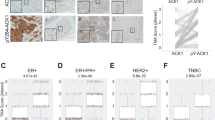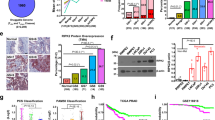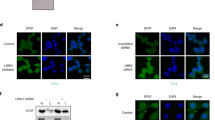Abstract
Deregulated tyrosine kinase signaling alters cellular homeostasis to drive cancer progression. The emergence of a non-receptor tyrosine kinase (non-RTK), ACK1 (also known as activated Cdc42-associated kinase 1 or TNK2) as an oncogenic kinase, has uncovered novel mechanisms by which tyrosine kinase signaling promotes cancer progression. Although early studies focused on ACK1 as a cytosolic effector of activated transmembrane RTKs, wherein it shuttles between the cytosol and the nucleus to rapidly transduce extracellular signals from the RTKs to the intracellular effectors, recent data unfold a new aspect of its functionality as an epigenetic regulator. ACK1 interacts with the estrogen receptor (ER)/histone demethylase KDM3A (JHDM2a) complex, which modifies KDM3A by tyrosine phosphorylation to regulate the transcriptional outcome at HOXA1 locus to promote the growth of tamoxifen-resistant breast cancer. It is also well established that ACK1 regulates the activity of androgen receptor (AR) by tyrosine phosphorylation to fuel the growth of hormone-refractory prostate cancers. Further, recent explosion in genomic sequencing has revealed recurrent ACK1 gene amplification and somatic mutations in a variety of human malignancies, providing a molecular basis for its role in neoplastic transformation. In this review, we will discuss the various facets of ACK1 signaling, including its newly uncovered epigenetic regulator function, which enables cells to bypass the blockade to major survival pathways to promote resistance to standard cancer treatments. Not surprisingly, cancer cells appear to acquire an 'addiction’ to ACK1-mediated survival, particularly under stress conditions, such as growth factor deprivation or genotoxic insults or hormone deprivation. With the accelerated development of potent and selective ACK1 inhibitors, targeted treatment for cancers harboring aberrant ACK1 activity may soon become a clinical reality.
This is a preview of subscription content, access via your institution
Access options
Subscribe to this journal
Receive 50 print issues and online access
$259.00 per year
only $5.18 per issue
Buy this article
- Purchase on Springer Link
- Instant access to full article PDF
Prices may be subject to local taxes which are calculated during checkout



Similar content being viewed by others
References
Mahajan K, Mahajan NP . Shepherding AKT and androgen receptor by Ack1 tyrosine kinase. J Cell Physiol 2010; 224: 327–333.
Mahajan K, Mahajan NP . PI3K-independent AKT activation in cancers: a treasure trove for novel therapeutics. J Cell Physiol 2012; 227: 3178–3184.
Manser E, Leung T, Salihuddin H, Tan L, Lim L . A non-receptor tyrosine kinase that inhibits the GTPase activity of p21cdc42. Nature 1993; 363: 364–367.
Mahajan NP, Whang YE, Mohler JL, Earp HS . Activated tyrosine kinase Ack1 promotes prostate tumorigenesis: role of Ack1 in polyubiquitination of tumor suppressor Wwox. Cancer Res 2005; 65: 10514–10523.
Mahajan NP, Liu Y, Majumder S, Warren MR, Parker CE, Mohler JL et al. Activated Cdc42-associated kinase Ack1 promotes prostate cancer progression via androgen receptor tyrosine phosphorylation. Proc Natl Acad Sci USA 2007; 104: 8438–8443.
Yokoyama N, Miller WT . Biochemical properties of the Cdc42-associated tyrosine kinase ACK1. Substrate specificity, authphosphorylation, and interaction with Hck. J Biol Chem 2003; 278: 47713–47723.
Gajiwala KS, Maegley K, Ferre R, He YA, Yu X . Ack1: activation and regulation by allostery. PLoS ONE 2013; 8: e53994.
Prieto-Echague V, Miller WT . Regulation of ack-family nonreceptor tyrosine kinases. J Signal Transduct 2011; 2011: 742372.
Prieto-Echague V, Gucwa A, Craddock BP, Brown DA, Miller WT . Cancer-associated mutations activate the nonreceptor tyrosine kinase Ack1. J Biol Chem 2010; 285: 10605–10615.
Lin Q, Wang J, Childress C, Yang W . The activation mechanism of ACK1 (activated Cdc42-associated tyrosine kinase 1). Biochem J 2012; 445: 255–264.
Prieto-Echague V, Gucwa A, Brown DA, Miller WT . Regulation of Ack1 localization and activity by the amino-terminal SAM domain. BMC Biochem 2010; 11: 42.
Mahajan K, Coppola D, Challa S, Fang B, Chen YA, Zhu W et al. Ack1 mediated AKT/PKB tyrosine 176 phosphorylation regulates its activation. PLoS One 2010; 5: e9646.
Mahajan K, Challa S, Coppola D, Lawrence H, Luo Y, Gevariya H et al. Effect of Ack1 tyrosine kinase inhibitor on ligand-independent androgen receptor activity. Prostate 2010; 70: 1274–1285.
Shen F, Lin Q, Gu Y, Childress C, Yang W . Activated Cdc42-associated kinase 1 is a component of EGF receptor signaling complex and regulates EGF receptor degradation. Mol Biol Cell 2007; 18: 732–742.
Chan W, Tian R, Lee YF, Sit ST, Lim L, Manser E . Down-regulation of active ACK1 is mediated by association with the E3 ubiquitin ligase Nedd4-2. J Biol Chem 2009; 284: 8185–8194.
Jones S, Cunningham DL, Rappoport JZ, Heath JK . The non-receptor tyrosine kinase Ack1 regulates the fate of activated EGFR by inducing trafficking to the p62/NBR1 pre-autophagosome. J Cell Sci 2014; 127: 994–1006.
Buchwald M, Pietschmann K, Brand P, Gunther A, Mahajan NP, Heinzel T et al. SIAH ubiquitin ligases target the nonreceptor tyrosine kinase ACK1 for ubiquitinylation and proteasomal degradation. Oncogene 2012; 32: 4913–4920.
Kramer OH, Stauber RH, Bug G, Hartkamp J, Knauer SK . SIAH proteins: critical roles in leukemogenesis. Leukemia 2013; 27: 792–802.
Urena JM, La Torre A, Martinez A, Lowenstein E, Franco N, Winsky-Sommerer R et al. Expression, synaptic localization, and developmental regulation of Ack1/Pyk1, a cytoplasmic tyrosine kinase highly expressed in the developing and adult brain. J Comp Neurol 2005; 490: 119–132.
La Torre A, del Rio JA, Soriano E, Urena JM . Expression pattern of ACK1 tyrosine kinase during brain development in the mouse. Gene Expr Patterns 2006; 6: 886–892.
La Torre A, del Mar Masdeu M, Cotrufo T, Moubarak RS, del Rio JA, Comella JX et al. A role for the tyrosine kinase ACK1 in neurotrophin signaling and neuronal extension and branching. Cell Death Dis 2013; 4: e602.
Hitomi Y, Heinzen EL, Donatello S, Dahl HH, Damiano JA, McMahon JM et al. Mutations in TNK2 in severe autosomal recessive infantile onset epilepsy. Ann Neurol 2013; 74: 496–501.
Galisteo ML, Yang Y, Urena J, Schlessinger J . Activation of the nonreceptor protein tyrosine kinase Ack by multiple extracellular stimuli. Proc Natl Acad Sci USA 2006; 103: 9796–9801.
van der Horst EH, Degenhardt YY, Strelow A, Slavin A, Chinn L, Orf J et al. Metastatic properties and genomic amplification of the tyrosine kinase gene ACK1. Proc Natl Acad Sci USA 2005; 102: 15901–15906.
Mahajan K, Mahajan NP . ACK1/TNK2 tyrosine kinase:An emerging target for cancer therapeutics. AACR Educ Book 2014; 2014: 6.
Shinmura K, Kiyose S, Nagura K, Igarashi H, Inoue Y, Nakamura S et al. TNK2 gene amplification is a novel predictor of a poor prognosis in patients with gastric cancer. J Surg Oncol 2013; 109: 189–197.
Manning BD, Cantley LC . AKT/PKB signaling: navigating downstream. Cell 2007; 129: 1261–1274.
Greer EL, Brunet A . FOXO transcription factors at the interface between longevity and tumor suppression. Oncogene 2005; 24: 7410–7425.
Huang H, Tindall DJ . Dynamic FoxO transcription factors. J Cell Sci 2007; 120: 2479–2487.
Mahajan K, Coppola D, Chen YA, Zhu W, Lawrence HR, Lawrence NJ et al. Ack1 tyrosine kinase activation correlates with pancreatic cancer progression. Am J Pathol 2012; 180: 1386–1393.
Schoenherr JA, Drennan JM, Martinez JS, Chikka MR, Hall MC, Chang HC et al. Drosophila activated Cdc42 kinase has an anti-apoptotic function. PLoS Genet 2012; 8: e1002725.
Burnstein KL . Regulation of androgen receptor levels: implications for prostate cancer progression and therapy. J Cell Biochem 2005; 95: 657–669.
Chen CD, Welsbie DS, Tran C, Baek SH, Chen R, Vessella R et al. Molecular determinants of resistance to antiandrogen therapy. Nat Med 2004; 10: 33–39.
Lupien M, Brown M . Cistromics of hormone-dependent cancer. Endocr Relat Cancer 2009; 16: 381–389.
Feldman BJ, Feldman D . The development of androgen-independent prostate cancer. Nat Rev 2001; 1: 34–45.
Edwards J, Bartlett JM . The androgen receptor and signal-transduction pathways in hormone-refractory prostate cancer. Part 1: Modifications to the androgen receptor. BJU Int 2005; 95: 1320–1326.
Mahajan K, Coppola D, Rawal B, Chen YA, Lawrence HR, Engelman RW et al. Ack1-mediated androgen receptor phosphorylation modulates radiation resistance in castration-resistant prostate cancer. J Biol Chem 2012; 287: 22112–22122.
Blanco-Aparicio C, Renner O, Leal JF, Carnero A . PTEN, more than the AKT pathway. Carcinogenesis 2007; 28: 1379–1386.
Liang J, Shang Y . Estrogen and cancer. Annu Rev Physiol 2013; 75: 225–240.
Green KA, Carroll JS . Oestrogen-receptor-mediated transcription and the influence of co-factors and chromatin state. Nat Rev Cancer 2007; 7: 713–722.
Fisher B, Costantino JP, Wickerham DL, Redmond CK, Kavanah M, Cronin WM et al. Tamoxifen for prevention of breast cancer: report of the National Surgical Adjuvant Breast and Bowel Project P-1 Study. J Natl Cancer Inst 1998; 90: 1371–1388.
Fisher B, Costantino JP, Wickerham DL, Cecchini RS, Cronin WM, Robidoux A et al. Tamoxifen for the prevention of breast cancer: current status of the National Surgical Adjuvant Breast and Bowel Project P-1 study. J Natl Cancer Inst 2005; 97: 1652–1662.
Howell A, DeFriend D, Robertson J, Blamey R, Walton P . Response to a specific antioestrogen (ICI 182780) in tamoxifen-resistant breast cancer. Lancet 1995; 345: 29–30.
Clarke R, Leonessa F, Welch JN, Skaar TC . Cellular and molecular pharmacology of antiestrogen action and resistance. Pharmacol Rev 2001; 53: 25–71.
Mahajan K, Lawrence HR, Lawrence NJ, Mahajan NP . ACK1 tyrosine kinase interacts with histone demethylase KDM3A to regulate the mammary tumor oncogene HOXA1. J Biol Chem 2014; 289: 28179–28191.
Schlieman MG, Fahy BN, Ramsamooj R, Beckett L, Bold RJ . Incidence, mechanism and prognostic value of activated AKT in pancreas cancer. Br J Cancer 2003; 89: 2110–2115.
Matsumoto J, Kaneda M, Tada M, Hamada J, Okushiba S, Kondo S et al. Differential mechanisms of constitutive Akt/PKB activation and its influence on gene expression in pancreatic cancer cells. Jpn J Cancer Res 2002; 93: 1317–1326.
Sakurada A, Suzuki A, Sato M, Yamakawa H, Orikasa K, Uyeno S et al. Infrequent genetic alterations of the PTEN/MMAC1 gene in Japanese patients with primary cancers of the breast, lung, pancreas, kidney, and ovary. Jpn J Cancer Res 1997; 88: 1025–1028.
Maxson JE, Gotlib J, Pollyea DA, Fleischman AG, Agarwal A, Eide CA et al. Oncogenic CSF3R mutations in chronic neutrophilic leukemia and atypical CML. N Engl J Med 2013; 368: 1781–1790.
Mahajan K, Mahajan NP . ACK1 tyrosine kinase: targeted inhibition to block cancer cell proliferation. Cancer Lett 2013; 338: 185–192.
Liu Y, Karaca M, Zhang Z, Gioeli D, Earp HS, Whang YE . Dasatinib inhibits site-specific tyrosine phosphorylation of androgen receptor by Ack1 and Src kinases. Oncogene 2010; 29: 3208–3216.
Tan DS, Haaland B, Gan JM, Tham SC, Sinha I, Tan EH et al. Bosutinib inhibits migration and invasion via ACK1 in KRAS mutant non-small cell lung cancer. Mol Cancer 2014; 13: 13.
DiMauro EF, Newcomb J, Nunes JJ, Bemis JE, Boucher C, Buchanan JL et al. Discovery of 4-amino-5,6-biaryl-furo[2,3-d]pyrimidines as inhibitors of Lck: development of an expedient and divergent synthetic route and preliminary SAR. Bioorg Med Chem Lett 2007; 17: 2305–2309.
Acknowledgements
This work was supported in part by Department of Defense (W81XWH-12-1-0248 and W81XWH-14-1-0251) to KM and by the National Cancer Institute, NIH (1R01CA135328), Department of Defense (W81XWH-14-1-0002 and W81XWH-14-1-0003) and Career Development Award by Moffitt Lung Cancer SPORE to NPM.
Author information
Authors and Affiliations
Corresponding authors
Ethics declarations
Competing interests
The authors are named as inventors on a US patent application no. 8 557 516, titled ‘AKT tyrosine 176 phosphorylation as cancer biomarker’.
Rights and permissions
About this article
Cite this article
Mahajan, K., Mahajan, N. ACK1/TNK2 tyrosine kinase: molecular signaling and evolving role in cancers. Oncogene 34, 4162–4167 (2015). https://doi.org/10.1038/onc.2014.350
Received:
Revised:
Accepted:
Published:
Issue Date:
DOI: https://doi.org/10.1038/onc.2014.350
This article is cited by
-
Role of HOXA1-4 in the development of genetic and malignant diseases
Biomarker Research (2024)
-
Improvement of ACK1-targeted therapy efficacy in lung adenocarcinoma using chloroquine or bafilomycin A1
Molecular Medicine (2023)
-
Epigenetic reprogramming of cell cycle genes by ACK1 promotes breast cancer resistance to CDK4/6 inhibitor
Oncogene (2023)
-
Host factor TNK2 is required for influenza virus infection
Genes & Genomics (2023)
-
Inhibiting ACK1-mediated phosphorylation of C-terminal Src kinase counteracts prostate cancer immune checkpoint blockade resistance
Nature Communications (2022)



